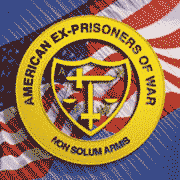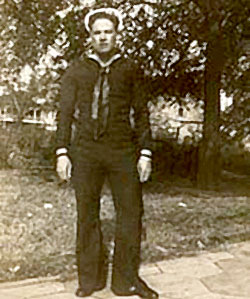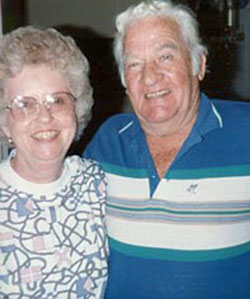
Established April 14, 1942
 |
American Ex-Prisoners of War
A not-for-profit, Congressionally-chartered veterans’ service organization advocating for former prisoners of war and their families.
Established April 14, 1942 |


Seaman James Muldrow, 1946
|

James with wife Priscilla, 1993
|
|
| Last Name | First Name, Middle Init. | Nickname |
| Street Add. | City | State |
| Zip | Spouse | |
| Conflict | Branch of Service | Unit: |
| Theatre of Operation | Military Job | Where Captured |
| Date Captured | Time Interned | Camps |
| Date Liberated | Medals Received | Age at Capture |
| After the War ... | ||
His first encounter with the enemy came quickly, just off the coast of Texas when a submarine was spotted stalking them. "When it was confirmed to be German, we opened fire, got two direct hits and sank it. We continued through the Caribbean into the South Atlantic. One night off the coast of South America, we collided with a cargo ship. We limped into port at Buenos Aires, off loaded our cargo, and under went repairs.
"After repairs were completed, we sailed to Cavenaus, Columbia and picked up a load of crude oil bound for Aruba, West Indies. The day before arriving in Aruba, a German submarine had shelled the port and torpedoed ships in the harbor. Seventy-two hours later, we left with a destroyer escort bound for Montevideo, Uruguay. Upon arrival we had liberty for a few days.
"On June 6, 1942, at approximately 10:00 a.m. off the coast of Brazil we encountered a ship out of a rainsquall flying the British flag. Immediately the sides of the ship dropped and a German flat went up. They opened fire with six-inch turrets and many smaller guns. We returned fire, but were no match for the German raider, Stier. The SS Stanvac Calcutta quickly sank."
After dark, the Stier returned and picked up what was left of survivors who'd been in the water for a very long time. Jimmy's left hand was severely wounded. They were later transferred to a German prison ship off the coast of Africa where they stayed in the cargo hole for about three and a half months with no medical attention. Conditions were atrocious. In Singapore James was put on a Japanese prison ship on its way to Japan.
Jimmy was interned in Japanese prisoner of war camps in Yokohama and Osaka. Conditions were bad, they were dirty, hungry, and tired, and the guards took pleasure in making things worse. They were beaten daily, and forced to work 12 hours a day in lumberyards, foundries, and shipyards. "We never got enough to eat, only two small bowls of rice a day and if you did not work, you did not eat."" They learned to outmaneuver the guards to steal food and destroy or damage their equipment when we got the chance. They knew, if caught, it meant punishment or death. These challenges kept them alert. They slept on a straw mat with one blanket, with no heat. Their clothing was discarded Japanese uniforms, which did not fit, but they covered their thin bodies.
"One day our guards disappeared," he said, "and that was when we knew the war was over."